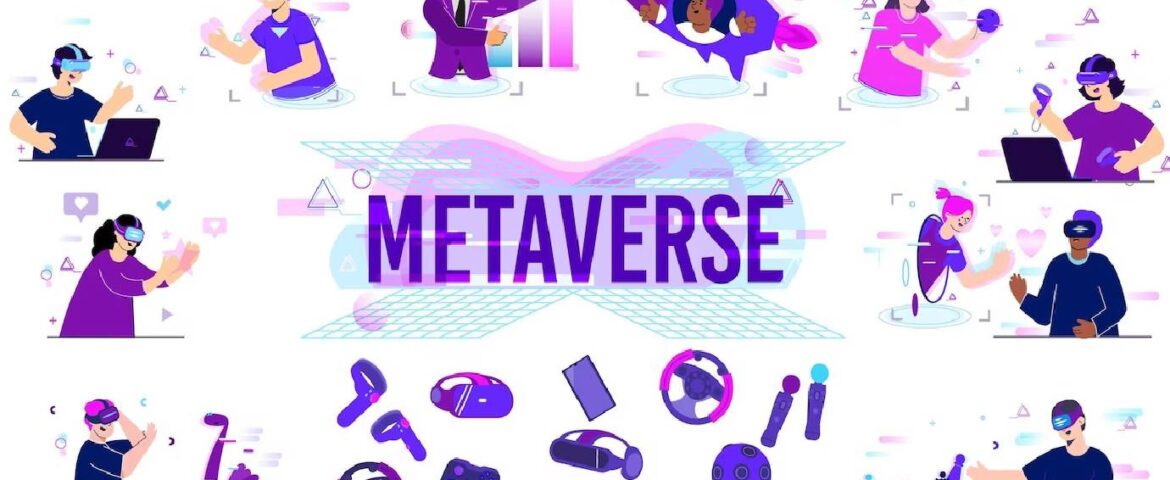The digital landscape is constantly evolving, and a new concept called the metaverse has emerged as a topic of fascination and exploration. The metaverse refers to a virtual world that extends beyond traditional two-dimensional online experiences. It is a space where people can interact with digital environments, socialize with others, and engage in immersive experiences. In this blog post, we will delve into the metaverse, its potential, and how it could revolutionize the landscape of digital marketing. Defining the Metaverse: The metaverse is a term that describes a virtual reality space where users can access and interact with various digital experiences. It is an interconnected network of virtual worlds, combining augmented reality, virtual reality, and other emerging technologies. Unlike the internet as we know it today, the metaverse aims to create a more immersive and seamless digital environment, blurring the lines between the physical and virtual worlds. Enhancing Customer Engagement: The metaverse holds immense potential for digital marketing by offering new avenues for customer engagement. Brands can create immersive experiences within the metaverse that allow customers to interact with their products, services, and brand story in unique and compelling ways. From virtual showrooms and interactive demonstrations to virtual events and experiences, the metaverse opens doors for brands to create memorable and engaging customer interactions that go beyond traditional online experiences. Personalization in the Metaverse: The metaverse has the potential to redefine personalization in digital marketing. With the ability to gather vast amounts of user data and insights within virtual environments, brands can deliver highly tailored experiences to individual users. By understanding user preferences, behaviors, and interactions within the metaverse, brands can personalize product recommendations, advertising, and even entire virtual experiences. This level of personalization creates a more meaningful connection between brands and consumers, increasing engagement and loyalty. Socializing and Community Building: The metaverse emphasizes social interactions and community building. Users can connect with others in virtual spaces, attend virtual events, and engage in shared experiences. Brands can tap into this aspect of the metaverse by creating virtual communities and spaces where customers can gather, interact, and share their experiences. These communities can foster brand advocacy, encourage user-generated content, and enable organic word-of-mouth marketing within the metaverse ecosystem. Virtual Commerce and Brand Presence: As the metaverse evolves, virtual commerce is expected to play a significant role. Brands can establish a presence within the metaverse by creating virtual stores, showrooms, or even entire virtual brand experiences. This allows customers to browse and purchase products within the metaverse, blurring the lines between physical and virtual shopping experiences. Additionally, brands can leverage virtual advertising spaces and sponsorships within the metaverse to reach their target audience in unique and immersive ways. Challenges and Considerations: While the metaverse holds tremendous potential, there are challenges and considerations to address. Privacy and security concerns, ensuring inclusivity and accessibility, and developing standards for interoperability are important factors to consider as the metaverse evolves. Businesses must navigate these challenges and prioritize ethical practices to build trust and ensure a positive user experience within the metaverse. Embracing the Future of Digital Marketing: The metaverse represents a paradigm shift in the way we interact with digital content and experiences. As it continues to evolve, businesses should keep a pulse on the metaverse and its potential impact on digital marketing. By staying informed, businesses can explore opportunities within the metaverse, experiment with immersive experiences, and find innovative ways to engage their audience and differentiate themselves in a rapidly changing digital landscape. Conclusion: The metaverse represents an exciting frontier in digital marketing, offering immersive and interactive experiences that go beyond traditional online platforms. With its potential to enhance customer engagement, personalize interactions, foster communities, enable virtual commerce, and drive innovation, the metaverse presents a new realm of possibilities for brands. By embracing this evolving landscape, businesses can stay at the forefront of digital marketing, creating compelling experiences that captivate and connect with their target audience in the metaverse and beyond.

